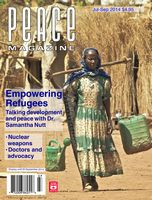
Peace Magazine Jul-Sep 2014, page 28. Some rights reserved.
Search for other articles by Mel Watkins here
By Douglas Roche. Toronto: Lorimer 2014
Let us take a moment to ponder the dedication in this book:
“Peace to the 360,000 children who will be born across the world on the day this book is published.”
And counting, and keep counting.
There is an increasing understanding among students of the matter that today’s world may be the most peaceful ever. That is the real news, the biggest unreported story. It is the surprising, deeply gratifying, message of psychologist Steven Pinker’s magisterial historical study The Better Angels of Our Nature: Why Violence Has Declined. It is also the inspiring message of Douglas Roche, Canada’s peacemaker extraordinaire.
Roche knows of what he speaks because, in his long life as an activist, he has helped make it happen. And just to make sure he’s got it right, he has interviewed a large number of other activists, whose views are the substance of this well organized, highly readable, book.
Roche wants to match the declining culture of war with a rising culture of peace that will constrain outbursts of violence. In a world that has experienced so many revolutions of rights, a burgeoning culture of peace will morph into the right to peace. “The violence of warfare and the number of wars have diminished, certainly in quantitative terms, but the political machinery to build the conditions for peace lumbers, one might say staggers, along.” Roche’s vision is bold and heroic and the author has labored hard to elaborate convincingly, as he does in this book, on the manner of its doing.
“A new global civilization is emerging,” writes Roche. It is not—as I would phrase his message—the constricted capitalist version of globalization. It is the version of those who have seen the world whole from space. It is the version that sees every human being as having the same rights as everyone else, the best of rights. It is the version that makes no false distinction between “nature” and “humanity.”
Like the good elder he is, Roche tours campuses, dialoguing with young people, who are the “Generation without Borders,” interconnected with the world. That phrase comes from his interview with that other great Canadian elder Roméo Dallaire. Roche asks, “So you think we can be optimistic for peace because change is starting to happen?” Dallaire replies, “If I didn’t have this hope, I’d be dead.”
Roche, who has aged so well, wants the young and the rest of us to hit the streets. When Obama was awarded the Nobel Peace Prize for pointing to the possibility of a nuclear weapons-free world, there should, says Roche, have been mass rallies around the world supporting him, locking him in.
Roche puts his hopes in particular with an increasing role for women. He reminds us, at this centennial of the Great War of 1914, that the Women’s International League for Peace and Freedom, which is actively functioning today, was founded in 1915 at the lowest point in that worst of wars. The time is due, he says, for the Secretary General of the UN to be a woman.
Roche is insistent that we pay more attention to the UN, for it plays the central role in building a culture of peace. In the world of the West, the UN no longer receives the respect it deserves, but it does where it matters most—in the Global South, to which power is increasingly moving.
Douglas Roche turned 85 this year. All of us should live so long, do so much good, and be so full of hope. He has earned our love and respect.
Let each of us spread the good news about this book. Buy it. Talk about it. Sing its praises. Shout your thanks so Douglas will hear us in Edmonton. Give a copy to a friend.
Reviewed by Mel Watkins, a retired U of Toronto professor of political economy.

Peace Magazine Jul-Sep 2014, page 28. Some rights reserved.
Search for other articles by Mel Watkins here